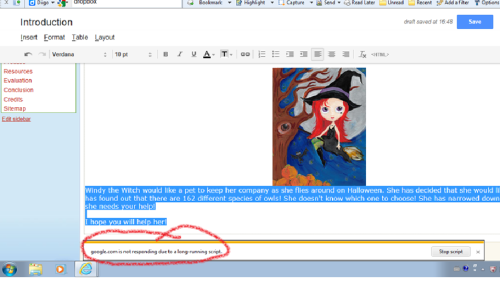So I managed to pull together a workable Webquest for my ECMP355 Learning Project but haven’t yet been able to try it out; I hope to be able to in the new year. This will be my last formal reflection on my project for this term but I will update when I have a chance to elaborate, apply or re-create another webquest!
I’m very much a self-directed learner. One who likes to teach herself things. A visual learner. One who likes to see things done but doesn’t have the attention span for long videos or movies. I am a sitcom watcher, not a movie-goer. The online class has been challenging for me because it is a long time for me to focus on a screen and voices. But I was up for the challenge.
When teaching myself something, I generally know where my learning is going, but because my vision changes the further along I go, and the more ideas I come up with, I never really know what path I’ll be on. I just know that when I get to where I need to be, I’ll know. It’ll look and feel and sound right. I don’t like to ask for help before I try to solve a problem myself. I enjoy problem/challenge identification and the problem solving process to figure things out. Having to be transparent meant that I was very cognizant of every piece of information that I gathered for my project. I did research online, saw people’s experiences via YouTube, spoke to teachers who have used Webquests, took information from our online and face-to-face ECMP355 classes and considered suggestions from people online during our class time. Much of my learning was trial and error, and I think that because I was allowed to choose what I wanted to learn I was much more motivated. I think that a project such as this one makes me realize that it is easy to rely on one way to learn something but if we use a variety of sources, we are able to get so much more, not the least of which is continuing to build a Personal Learning Network to exchange ideas in the future, as well.
I was the kid who started a million projects and didn’t finish them because I got bored of them. Drove my parents crazy. I am the adult who has bought all the materials and taught herself how to scrapbook, do stained glass stepping stones, do stamped card-making, cake and cupcake decorating, and a little bit of photography. But never at the same time. I do one, get bored, move on. Now I’m driving my husband crazy. My little ‘interest stashes’ all over the storage room are a bit out of control! That is one of the reasons that I chose a learning project that would have a product that I could ‘end’ with. I know that learning how to do a webquest doesn’t have to end. It can always be developed at a different grade levels, use different types of problems and reach different levels of webquest taxonomy. I was afraid that I would ‘give up’ or ‘get bored’ without a product in mind.
So being transparent was sometimes a challenge. I would wake up at 3 in the morning with a GREAT idea and would jot it on a notepad on my bedside table. Then I’d search out the information online the next day. I didn’t document everytime I did that or I would be documenting All. The. Time. I was surprised at the amount of learning that I got from various places, having been a person who was used to researching in books and articles.
I didn’t realize how much of a perfectionist I was until I had to be transparent. It has been hard for me to break down the learning to my project publicly because I like to keep my process my ‘secret.’ I like people to see the sparkly, fabulous product or result of my learning endeavours but not the messy, unorganized process that I take to get there because that is inexplicable, even to me. I want them to see how brilliantly creative I am (What? Too much?) and not the struggles and frustrations that I went through to make it so. I tried to be reflective and show those things for this project, though.
Our class was asked to contribute to the rubric or to help identify what we would look for in a successful learning project. I contributed the following to our Google Doc for class discussion:
Regular updates via blog on progress (weekly?)
Identification of struggles/roadblocks
Resources








